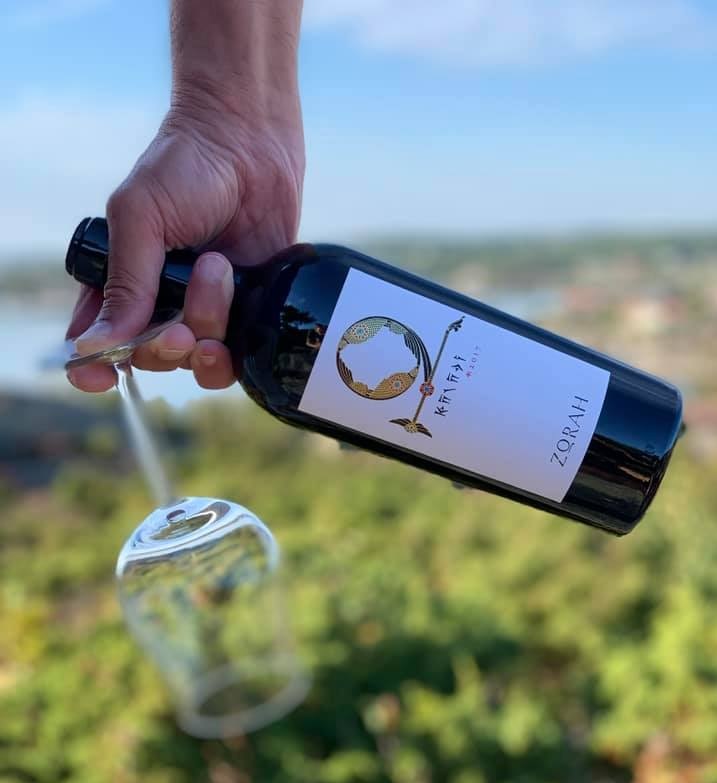Armenian star’s clay jar-raised 2018 Karasì Areni Noir

Time flies, as they say. Seems like only yesterday we were introducing Zorah to Australia. “This is exciting. Something new, from 6,000 years ago,” we lamely joked. That was the 2013 rendition of Karasì, and in the blink of an eye we’re on our sixth vintage of this ancient-world amphora-raised Areni Noir.
And yet time stands still – or at least that’s how it looks among these breathtaking mountain vineyards planted a stone’s throw from where the world’s oldest (4,000 BC) wine cellar was discovered.
Zorah’s founder Zorik Gharibian doesn’t stand still, though. Not only has he since added the Voskì white blend to the range, but he’s tireless in spreading the love for his Armenian heritage.
Last year’s harvest took place against a backdrop of war with neighbouring Azerbaijan. Those heartbreaking developments only make wine – a symbol of patience, harmony and sharing – seem all the more special.
2017 Zorah Voskì Voskeat Garandmak $64
Ancient indigenous varieties, archaeological evidence suggests that both Voskèat and Garandmak have been present in Armenia for millennia. Voskèat translates as “golden seed” and is considered queen of Armenia’s grapes. It’s a delicate, gold-coloured grape with small, compact, relatively thin-skinned berries and bunches in the shape of a cross. Garandmak means “fat tail” and is one of the most popular grapes. It’s a much hardier variety, greenish yellow in colour, with larger, thicker-skinned berries and compact bunches.
Although both varieties are present throughout Armenia’s territory, the exceptional terroir of Vayots Dzor – with its high-altitude, low-vigour, phylloxera-free, rocky, sandy soils coupled with wide diurnal temperature range – yields distinctively balanced fruit. The grapes for Voskì are sourced from old vineyards at altitudes of 1400m from vines grown on original, ungrafted roots.
Fermentation with indigenous yeasts occurs in large, temperature-controlled concrete vats which are left rough deliberately to favour micro-oxygenation. Ageing then continues in concrete vats for eleven months with a further six months in bottle. Concrete is preferred to stainless steel as it allows the wine to breath over the maturation period.
This is a blend of local white varieties Voskeat and Garandmak, 1400m altitude, concrete fermentation and ageing. Nutty and stony with nice texture. Smooth with some richness, showing pear and white peach fruit with some delicacy. Very harmonious.
93 points. Jamie Goode, wineanorak.com
2018 Zorah Karasì Areni Noir $64
The vineyards are at altitudes of 1400m. It’s a phylloxera-free terroir with low-vigour, sub-alkaline sandy soil, rich in limestone and large stones. The cuttings of the vines come from ancient abandoned vineyards of a nearby 13th century monastery. The unique confluence of the environment – high altitudes, low-vigour soil, huge day/night temperature swings of 20°C and late October harvest – all contribute to the creation of a wine of tremendous character.
Stainless steel tanks have given way to temperature-controlled rough concrete vats in which the wines are fermented exclusively with indigenous yeast. The micro-oxygenation in the concrete is similar to that of the traditional clay amphorae ‘karas’ in which the wine is then aged for around twelve months. The ‘karas’ used are of varying sizes. Some are buried in the ground while others are above ground, each giving their own unique nuances to the wine they contain. After very light filtration the wine is aged for a further six months in bottle.
2017 Zorah Karasì Areni Noir MAGNUM $141
Redcurrant jelly, charred meat, cement, dried roses and dried herbs, black fruits in there too. It’s dry and meaty, with dry tannin, but does possess an intriguing perfume, sappy, and brambly, it’s somewhat uncompromising, yet charming too. Some cranberry like crunch to the acidity, with the fresh dry feel that cranberry juice has on a solid finish. Raspberry too, and a turkish delight fragrance following. If you’re interested in the wider world of wine, I’d recommend giving this a go.
93 points. Gary Walsh, The Wine Front November 2019

